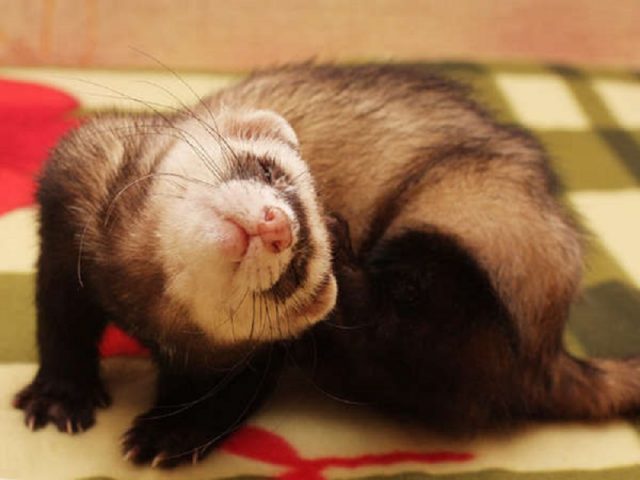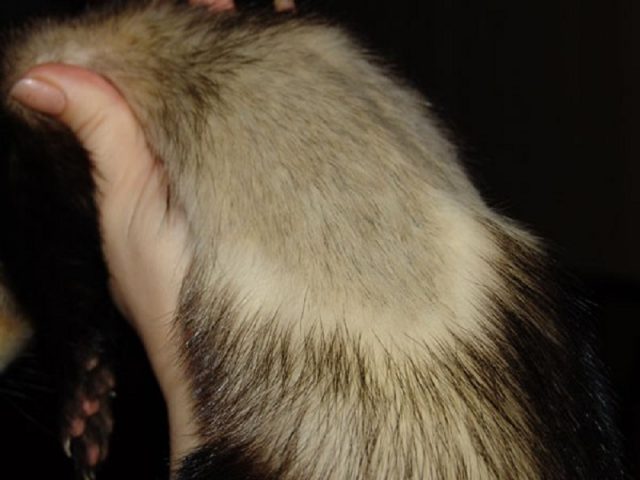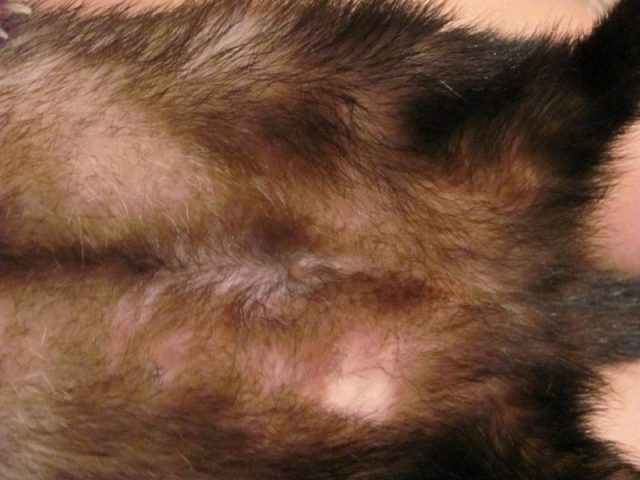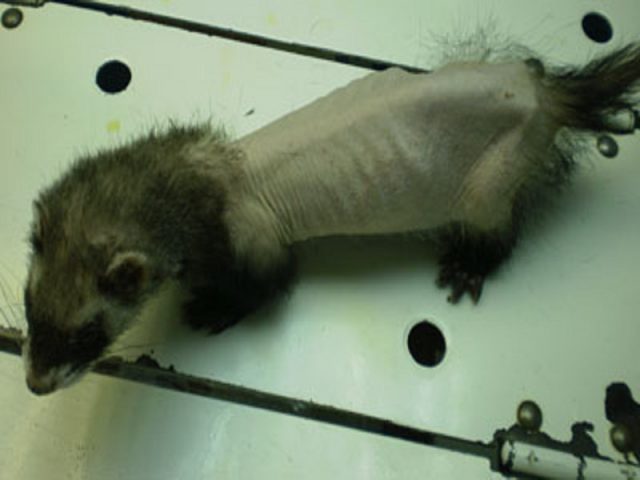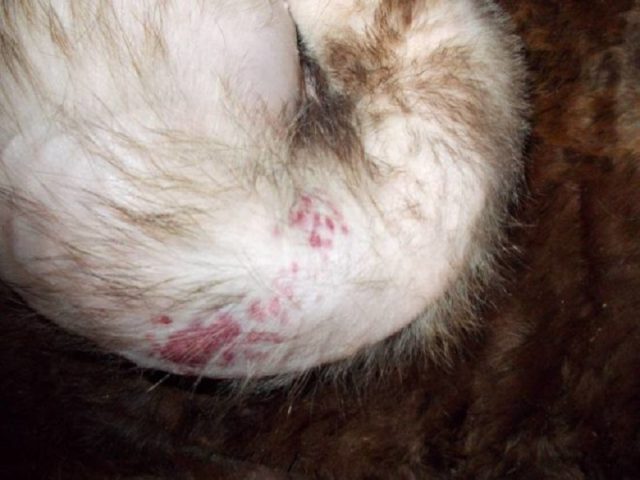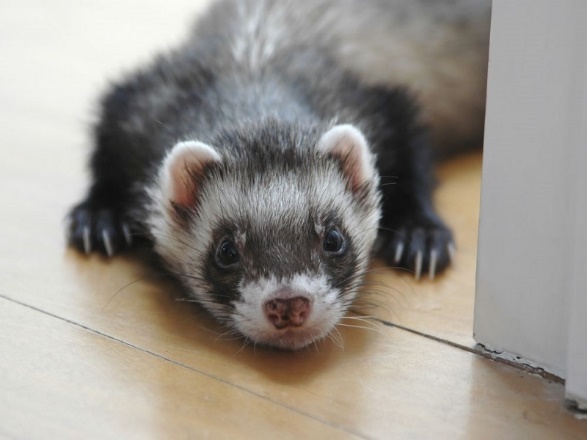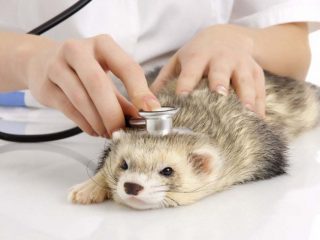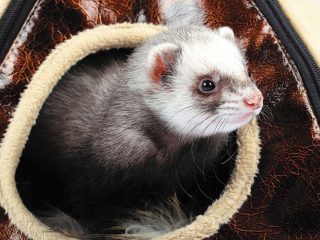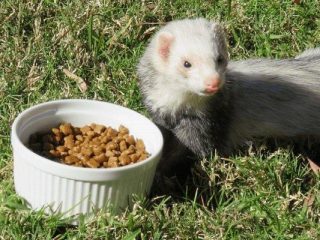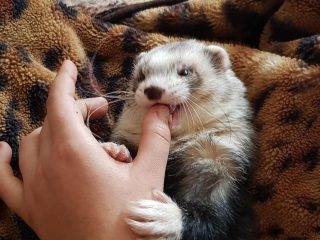Content
Even with good health and immunity, animals sometimes get sick. If your ferret is going bald and itchy, then you should pay attention to his behavior and the presence of other symptoms. In order to find out the cause, knowledge about existing diagnoses, how to make them and treatment options is necessary.
Natural Causes of Hair Loss in Ferrets
The ferret sometimes actively loses its fur. The process may start from the tail or another part of the body. The cause of baldness is the natural physiological processes of the animal’s body or acquired pathologies.
If your ferret becomes partially or completely bald, a visit to the veterinarian is necessary for an accurate diagnosis.
After examination, the doctor may indicate one of the natural causes:
- molting;
- clogged pores of the animal's skin;
- stressful situations;
- ferret rutting season;
- female pregnancy and childbirth;
- infection with skin parasites;
- imbalance and errors in diet;
- avitaminosis;
- age of animals.
In these cases, the situation is corrected naturally or as a result of simple manipulations.
If the ferret is going bald and itchy due to pathologies, tests and treatment are necessary according to the regimen suggested by the doctor.
Shedding
The natural process of molting in ferrets occurs twice - in spring and autumn. The process begins with the tail and gradually moves to the body. New fur grows while the old one has not yet completely fallen out. For this reason, the animal not only goes bald, but also itches.
The owners can help him get rid of any remaining fur by combing or plucking them. The skin at this time has a blue tint and is very itchy. Ferrets actively lick their hairs, their remains can be found in the feces.
In the summer heat, ferrets experience alopecia areata. According to experts, in this way they regulate the temperature of their body, protecting them from overheating. There is no unconditional evidence for this version, but the fur is restored after some time.
The speed of shedding varies. An animal can go bald very quickly. If it is bare, but new fur is already emerging, then there is no reason to worry.
Stress
Fur loss can be a consequence of a stressful situation in which the ferret finds itself.
Animals are sensitive to the environment and emotional situation. They may react not only by changing their behavior, but also by losing their fur. The reasons are:
- decreased activity – if there is a lack of opportunity to move, the animal’s mood drops;
- lack of a house - the ferret is stressed if there is no reliable shelter;
- loneliness - the animal gets used to communication, the deprivation of which leads to depression;
- a new individual - unfriendliness, aggression of a neighbor has a negative effect on the ferret;
- change in environment - new food, place, smells, cage can have an exciting effect on the animal;
- noise – loud, incomprehensible sounds are frightening;
- travel – changing location can lead to stress;
- illness or death of nearby animals has a depressing effect on the ferret.
All causes of stress that lead to the animal going bald can be corrected. This is achieved by organizing a shelter, an area for games, placing it in a quiet room, and isolating it from other aggressive and sick animals.
Changes in hormonal levels
Male ferrets often go bald and itch during the rut; females often become itchy during pregnancy. During this period, hormonal imbalance occurs.
Males behave extremely excitedly, irritably, and aggressively. They mark the territory in which they live, their fur becomes greasy and odorous. The ferret is not interested in walks or games. The animal can break the bars in the cage, the appetite disappears, and the weight decreases. If there are not enough females, this behavior continues until winter. A partial solution to the problem when keeping at home is considered to be castration of the ferret at the age of 11 months.
Hair loss during this period is considered physiological and goes away on its own.
Excess hormones can cause clogged pores due to excessive sebum production during the rut. As a result, the animal becomes bald and itchy.
Violation of feeding rules
The beauty of a ferret's fur depends on its diet. When it is violated, the animal's fur becomes dull, falls out, its skin dries, itches, and itches. The animal is going bald.
Proper nutrition of the animal is necessary for recovery. It includes meat (offal, minced meat), less often fish, boiled eggs. Can be used in small quantities of vegetables, cheese, vegetable fat, fish meal. Meat should be given along with cereals.
“Human” food should be prohibited.This includes sausages and smoked products. Cat and dog food and chicken heads are not suitable for ferrets.
To improve the quality of an animal's fur, complex vitamins are used. They are selected and advised by a veterinarian.
Skin parasites
If a ferret's tail becomes bald, it itches, and bites off the remnants of fur, then the animal should be examined for the presence of skin parasites - lice, nits, fleas.
Fleas are less common in animals than in cats and dogs. Symptoms of infection are itchy skin, areas without fur, scabs and papules. With large lesions, anemia occurs and the growth of young ferrets slows down. Chemicals are used to control parasites. They are used if the animal weighs at least 600 g and is over 6 months old. Contraindications to the use of drugs are pregnancy and weakened animals.
For preventative purposes, wool treatment should be carried out twice a year.
Allergy
There are some allergy sufferers among ferrets. Such animals become bald, their body itches, their skin turns red and peels.
Allergies are caused by dysbacteriosis, the use of antibiotics, contact with household chemicals, and the use of cosmetics to wash the ferret's bedding, its toys, and the animal itself.
A reaction in the form of hair loss can be caused by products not intended for the animal, or flea bites.
For food and other types of allergies, it is necessary to exclude the product or its cause.
Why the ferret itches and goes bald: diseases and their treatment
Ferrets can also go bald due to more serious diseases. You can often observe how the animal scratches its muzzle, fixes its fixed gaze, and drags its paws. These are signals of insulinoma. The disease is difficult to treat. It is necessary to contact a specialist.Lack of hair can signal diseases:
- eczema – wet, bare, flaky areas on the skin that are difficult to treat;
- fungal diseases – inflamed bald patches form on the ferret’s body;
- neoplasia – neoplasms of the body;
- endocrine diseases of animals.
Adrenal damage
In ferrets over three years of age, an adrenal gland disease occurs, in which the animal becomes bald, starting from the tail, moving to the hips and body, excluding the head and paws.
The causes of hair loss are:
- early spaying and neutering of ferrets;
- increasing daylight hours in urban environments due to artificial lighting.
Among the main symptoms of adrenal gland damage are:
- hair loss is symmetrical or without a visible pattern;
- lack of appetite in the animal;
- lethargic behavior of the ferret;
- thinning fur;
- thinness and transparency of the skin with ulcers;
- itching;
- strong musky ferret odor;
- excessive sexual activity in males;
- swelling of the vulva in spayed females;
- difficulty urinating due to an enlarged prostate;
- weakness of the animal's hind legs;
- strong thirst;
- loss of muscle mass.
The method of treatment depends on the age, condition and disease of the ferret. Among them;
- hormone therapy – a capsule with medicine is implanted;
- surgical intervention – removal of the diseased adrenal gland;
- combined method – combines the first two.
Timely assistance can prolong the life of an animal and restore its fur.
Ticks
Ferrets may go bald when infested with Sarcoptes mites. Symptoms include:
- hair loss;
- peeling of the skin;
- purulent discharge on the affected areas;
- decreased appetite
- loss of body weight.
If left untreated, the ferret will die.
In the area of the ears, the animal becomes bald when infected with Otodectes mites, the symptoms of which are:
- scratching;
- black discharge;
- decreased appetite;
- loss of physical activity.
An advanced disease can lead to deafness in a ferret.
Treatment should be carried out under the guidance of a veterinarian. The drug Ivomec, which is instilled into the animal’s ears, helps in the fight against ticks.
Tumors
Adrenal tumors are common in ferrets over 3 years of age. The functions of the organ are disrupted as a result of benign or malignant tissue degeneration. Development is promoted by an excess of hormones secreted by the adrenal glands. The animal can live another 2 - 3 years after the first symptoms appear, since the pathology develops slowly.
It is worth paying attention to the appearance of signs:
- the fur becomes dull and becomes ruffled;
- hair loss begins from the tail, back, chest, and abdomen;
- the animal's skin becomes thinner in the area of baldness;
- the ferret is losing weight;
- in the female, the loop increases in size, even if she is sterilized;
- in males there is a “forked stream” (difficulty urinating).
After collecting anamnesis and laboratory tests, the veterinarian makes a diagnosis.
Treatment for a ferret involves surgical removal of the affected organ. The use of chemotherapy drugs is practiced.
Mycoses
Dermatomycosis is caused by a skin fungus. It reproduces by spores and affects the fur and skin of the animal. The fungus grows in the epithelium and forms more and more new lesions. The parasite feeds on keratin contained in the skin and wool. After redness and itching appear, the ferret becomes bald and itches.If there are abrasions and scratches on the body, infection passes even faster.
The cause of infection can be sick animals or failure to comply with sanitary standards for keeping the animal.
The incubation period of the disease can last up to 30 days, after which symptoms of the pathology appear:
- hair loss;
- dry skin;
- itching;
- peeling.
Examining the ferret is not enough to make a diagnosis. Symptoms of dermatomycosis are similar to those of other diseases. The use of fluorescent diagnostics is required, which can show the presence of fungus in an animal.
Treatment of a ferret consists of removing fur from areas near the lesions to stop further spread of the disease and applying antifungal ointments prescribed by a doctor. In difficult cases, the animal is prescribed antibiotics.
Treatment lasts about a month.
Other diseases
Due to a lack of vitamin H in the ferret's body, hypovitaminosis can develop. The pathology is characterized by damage to the skin. Biotin (vitamin H) deficiency occurs when animals are frequently fed raw chicken proteins. They interfere with the absorption of biotin by the body.
Among the symptoms of the disease:
- inflammation of the skin;
- seborrhea;
- hair loss;
- hair section;
- itching
To treat a ferret, vitamin supplements containing biotin or products containing it are prescribed - liver, kidneys, raw chicken egg yolks.
For the purpose of prevention, chicken egg whites should be fed to the animal in a heat-treated form.
Other pathologies also lead to hair loss in ferrets:
- luteomas;
- fibrosarcomas;
- carcinomas;
- sertolinomas;
- diabetes.
In what cases should you contact a veterinarian?
In case of diseases of the adrenal glands, seeking help from a specialist is necessary when the first signs of illness appear in your ferret. If the animal is going bald, itching, behaving aggressively, going into prolonged estrus or rutting, or experiencing pain when urinating, then you need to hurry while there is still hope for recovery.
After surgical treatment, the ferret recovers quite quickly. After a week, the fur begins to grow and after a month the fur becomes the same.
You should consult a doctor if you cannot restore the animal’s fur on your own within a month.
Conclusion
The reasons that a ferret is going bald and itchy can be different: from a banal diet disorder to serious pathologies - malignant tumors, inflammation of the adrenal glands. In any case, it is necessary to carefully consider changes in the appearance and behavior of the animal. This will save the life of the ferret and, possibly, the owners from contracting infections transmitted to humans. If the maintenance rules are followed, problems with health and fur in ferrets rarely occur. If this happens, the problem should not come as a surprise.
